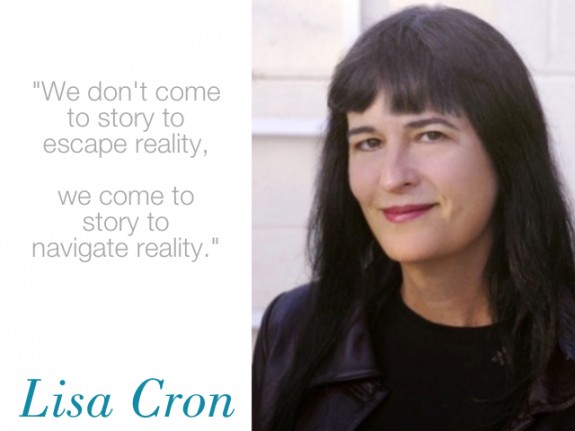Lisa Cron is the author of WIRED FOR STORY: The Writer’s Guide to Using Brain Science to Hook Readers From the Very First Sentence, and her video tutorial Writing Fundamentals: The Craft of Story can be found at Lynda.com. She’s worked in publishing at W.W. Norton, as an agent at the Angela Rinaldi Literary Agency, as a producer on shows for Showtime and CourtTV, and as a story consultant for Warner Brothers and the William Morris Agency. Since 2006, she’s been an instructor in the UCLA Extension Writers’ Program. Her passion has always been story, and she currently works as a story coach. You can find her online at her website or as @LisaCron on Twitter.
For as long as I can remember, stories were how I made sense of the world so it was no huge surprise when I eventually picked up a pencil and started writing them all down. Even as an adult, I’ve always been a sucker for a good story. Case in point; in 2004, I told my husband that the Red Sox would make a comeback at the last minute and win the World Series. After the series ended, lawyer-hubby asked me how I had been so sure and my response was: “It made for a good story.”
You could say I’m a story junkie, and for the longest time I thought I was alone. When I came across Lisa Cron’s new book Wired for Story it was like waking up. Turns out all humans not only love stories, but need them in order to survive. Stories are programmed into our very biology. Says Cron: “Story didn’t evolve for fiction, story evolved as a way of giving the facts context, and thus meaning.” No surprise here. We’ve all seen cave paintings, and we know that our ancestors had a rich history of verbal storytelling. What really fascinates me with Cron’s argument is this idea that stories are wired into our brains. Stories are more than a sociocultural construct, they are part of our neurological make-up.
So, how can we as writers use that information to improve our craft?
In her book, Cron explores the cross-section between neuroscience and story-telling to explain why people attach themselves to some stories while pushing away from others. By understanding what makes people care more about one story than another, authors can direct their words much more carefully. Choosing to represent our stories in a way that appeals to what the brain craves.
The story techniques she covers not only apply to fiction, but to advertising, e-mails, and any other method of communication. No matter what your profession, if you use words to communicate ideas, you need to know how to tell a good story. Cron’s research sheds light on how you can use the art of story-telling to improve your communications and become more persuasive.
Cron advises writers to”stop polishing. Stop worrying if your writing is good enough, or your sentences beautiful enough. Words are the handmaiden of story, not the other way around. It’s the story that gives those beautiful words their power.”
One technique Cron suggests for writers is the”And So?” rule of writing. Go through your writing and ask yourself “And so?” for each paragraph, each line of text. You’re basically asking yourself “So what? Why do I need this?” for every thing you’ve written. If you don’t have a good reason for including a piece of information take it out. “Root out things the reader doesn’t need to know, but that may have slipped in when you weren’t looking,” says Cron.
Make sure you give your reader only what they NEED to know. She says you should also focus on when they need to know the information. Do they need to know right at this minute? If not hold back and share the information only when the reader needs it.
A great thing to remember. No matter how good the writing, if the story doesn’t grab the reader the what’s the point? Without readers, stories have no reason for existing. In the constant barrage of writing do’s and don’ts, it can be easy to forget why we got into writing in the first place. The same thing that motivates us as writers and as readers: it’s all about the story.
I’m thrilled to announce that Lisa will be speaking at Lit Loft and can’t wait to hear her insights about reading and writing stories.

Lisa Cron will be speaking at LitLoft 2013
Are you ready for Lit Loft? Registration Closes Thursday, so act fast!








